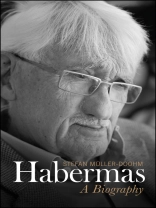‘Jürgen Habermas’, wrote the American philosopher Ronald Dworkin on the occasion of the great European thinker’s eightieth birthday, ‘is not only the world’s most famous living philosopher. Even his fame is famous.’ Now, after many years of intensive research and in-depth conversations with contemporaries, colleagues and Habermas himself, Stefan Müller-Doohm presents the first comprehensive biography of one of the most important public intellectuals of our time. From his political and philosophical awakening in West Germany to the formative relationships with Adorno and Horkheimer, Müller-Doohm masterfully traces the major forces that shaped Habermas’s intellectual development. He shows how Habermas’s life and work were conditioned by the possibilities offered to his generation in the unique circumstances of regained freedom that characterized postwar Germany. And yet Habermas’s career is fascinating precisely because it amounts to more than a corpus of scholarly work, however original and influential that may be. For here is someone who continually left the protective space of the university in order to assume the role of a participant in controversial public debates Ð from the significance of the Holocaust to the future of Europe Ð and in this way sought to influence the development of social and political life in an arena much broader than the academy. The significance and virtuosity of Habermas’s many writings over the years are also fully and expertly documented, ranging from his early work on the public sphere to his more recent writings on communicative action, cosmopolitanism and the postnational condition. What emerges from this biography is a vivid portrait of one of the great public intellectuals of our time Ð a unique thinker who has made an immense and lasting philosophical contribution but who, when he perceives that society is not living up to its potential for creating free and just conditions for all, becomes one of its most rigorous and persistent critics.
قائمة المحتويات
- Table of Contents
- Acknowledgements
- Preface
- Prologue: The Other among his Peers
- Part I: Catastrophe and Emancipation
- Chapter 1: Disaster Years as Normality. Childhood and Youth in Gummersbach
- Born in 1929
- Turning point: 1945
- Chapter 2: At University in Göttingen, Zurich and Bonn
- Doctorate on the philosophy of Schelling
- Speaking out as a freelance journalist
- The beginnings of a career as a public intellectual
- Part II: Politics and Critique
- Chapter 3: Education intellectuelle in Café Marx
- Mutual trust between Habermas and the Adornos
- Horkheimer’s animosities towards the ‘dialectical Mr H.’
- The ‘most promising intellectual’
- Chapter 4: Under the Aegis of Conflicting Personalities: Abendroth and Gadamer
- A man of the democratic left
- Positions in the dispute over the right form of critique and good politics
- Chapter 5: Back in Frankfurt. Torn between Academic Work and Political Practice
- In search of an epistemological foundation for critique
- Thinking with the protest movement against the protest movement
- In the line of fire from his own side
- A new track in philosophical thought
- Chapter 6: In the Ivory Tower of Social Scientific Research
- Between Academic Management and Research
- A theory about the impossibility of not learning
- The minefield of political interpretations in the ‘German Autumn’
- Resignation
- Part III: Science and Commitment
- Chapter 7: Genius Loci: In Frankfurt for the Third Time
- The major work
- The theory of action
- System and lifeworld
- Everyday life in Frankfurt
- Chapter 8: New Projects
- Under the spell of the philosophy of law
- Morality and law
- Chapter 9: Battles over the Politics of Ideas
- Opinion leader of the new left?
- The historians’ debate
- Habermas as a sceptic towards reunification
- Chapter 10: Against Germanomania and Nationalism
- Habermas’s ambiguous attitude towards military interventions
- The Asylum Debate
- A memorial to the murdered Jews
- Part IV: Cosmopolitan Society and Justice
- Chapter 11: Critique as a Vocation. The Transition into the Third Millennium
- A plea for freedom of the will and the inviolability of the person
- The philosopher as globetrotter
- Many honours and an affair
- Chapter 12: The Taming of Capitalism and the Democratization of Europe
- Democratic politics Ð a counterbalance to capitalism?
- European integration
- On the way to a democratically constituted world order
- Chapter 13: Philosophy in the Age of Postmetaphysical Modernity
- What can I know? – Linguistic pragmatics as a form of naturalism and realism
- What should I do? From the demand of virtue to the assumption of rationality
- What may I hope? Religion in a post-secular society
- What is Man? Language and Intersubjectivity
- Chapter 14: Books at an Exhibition
- Consciousness-Raising and Rescuing Critique
- Epilogue: The Inner Compass
- Notes
- Appendix
- Genealogy
- Chronology
- List of Habermas’s lectures and seminars
- Bibliography
- List of archives
- Illustration credits
- Index
عن المؤلف
Stefan Müller-Doohm, born in 1942, studied in Frankfurt under Theodor W. Adorno and Max Horkheimer and is now Professor Emeritus of Sociology and Director of the Research Centre for the Sociology of Intellectuals at the University of Oldenburg. His other works include Adorno: A Biography.












